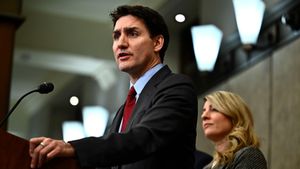Belgium officially welcomed its new federal government on February 3, 2025, marking the end of nearly eight months of intense negotiations known as the "Arizona" coalition. Bart De Wever, leader of the Flemish nationalist New Flemish Alliance (N-VA), was sworn in as Prime Minister during a ceremony held at the Royal Palace, attended by King Philippe and 14 newly appointed ministers.
This government formation is pivotal, as it marks the first time a Flemish nationalist leads Belgium's federal government. The coalition consists of five political parties: the N-VA, the Flemish Christian Democrats (CD&V), the socialist party Vooruit, the French-speaking Reformist Movement (MR), and the centrist party Les Engagés. The coalition's formation follows elections held in June 2024, from which the N-VA emerged significantly stronger, driven by its advocacy for greater regional autonomy.
During the swearing-in ceremony, De Wever emphasized his commitment to improving the situation for all regions of Belgium—Flanders, francophone Wallonia, and the multilingual Brussels-Capital region. "You cannot just wait for the system to change. You have to participate, obtain what you can for your community, and that's what we did," he remarked, as reported by De Standaard. This statement captures his pragmatic approach to governance amid the complex regional dynamics.
Despite the coalition's ambitious plans, it has already faced criticism, particularly concerning gender representation. With only four women out of fifteen ministers, critics such as former Groen leader Meyrem Almaci lamented, "A government of men, for men. We are back in the 20th century." This sharp critique underlines the stark difference from the previous government, known for achieving near parity between genders.
The new government aims to navigate Belgium's challenging financial situation, characterized by high national debt exceeding 100% of GDP—one of the highest rates within the European Union. The coalition's agenda includes significant reforms targeting budget cuts, social policies, and increased defense spending. A notable aspect of the new coalition is their intention to raise the defense budget to 2% of GDP, aligning with NATO's requirements. De Wever was quoted saying, "We hope to get it to 2%,” indicating both ambition and urgency to bolster Belgium’s global standing.
One of the immediate tasks facing the Arizona coalition is stabilizing the financial sector, which received warnings from the banking federation Febelfin about potential adverse effects from proposed tax increases. The sector expressed concerns, arguing the new bank tax structure could impede their ability to support the economy. The bank federation noted, "These measures do go very far," highlighting their apprehension about maintaining economic stability with increased taxation.
On matters of migration, De Wever hinted at stricter policies, reflecting public sentiment demanding more controlled immigration. "The population has demanded we evolve to stricter policies, and we will,” he stated outside the EU summit. This approach aligns with the government's agenda to reduce the number of asylum seekers and streamline the reception process for newcomers, signaling potential policy shifts aimed at tightening immigration controls.
The coalition has also acknowledged its challenge of bridging deep ideological divides among its members. For example, the priorities of the conservative N-VA diverge considerably from the more liberal factions represented by the MR. The lengthy negotiations leading to the formation of this coalition mirror the difficulties inherent in reaching consensus among such diverse political factions, with the Arizona group often described as one of contradictions.
One significant inclusivity concern raised is the limited representation of women. The current cabinet has received backlash for its all-male core leadership, as all seven Deputy Prime Ministers are men. This lack of diversity has drawn criticism from various quarters and highlights the work yet to be done to create equitable representation within Belgium's political framework.
De Wever's government will also have to strategically approach modernization efforts, particularly through technology adoption. Plans to utilize AI-enhanced facial recognition for law enforcement are on the table, which may spark fresh debates over privacy and surveillance rights within the nation. Legal experts have noted the necessity of operating within “a strictly defined legal framework” to implement such technology responsibly.
Stepping onto the European stage, De Wever’s first day as Prime Minister coincided with his attendance at the EU summit, where he engaged with other European leaders. His diplomatic skills will be tested as he balances domestic goals with the demands of international relations, particularly concerning defense and economic cooperation with the EU and the United States.
Despite skepticism about the new cabinet, leaders within the government such as Maxime Prévot, the new Foreign Minister, remain optimistic. Prévot expressed confidence about ensuring stability within the coalition, amid concerns raised during the previous government about potentially disruptive dynamics. He noted the importance of collaboration to make this administration successful.
The path forward for Belgium's new federal government is laden with challenges—navigational hurdles of economic, social, and regional interests. With key players at the helm and ambitious plans outlined, the dynamics of governance will be pivotal as Belgium embarks upon this new political chapter.



